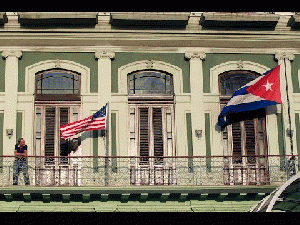In March 2015, the U.S. Department of State will publish its annual review of countries it considers to be a State Sponsor of Terrorism.
With the December 17, 2014 announcement of opening of diplomatic relations between the United States and Cuba, removing Cuba from the State Sponsored Terrorism List is the next logical step followed by lifting the onerous restrictions of the U.S. Blockade of Cuba.
But logic has not been a part of U.S. geo-political dealings with Cuba. In reviewing what is available to the public in the State Department's online annual report, "Country Reports on Terrorism," and its predecessor report "Patterns of Global Terrorism," for 17 years from 1996 through 2013, the reports reveal more a policy of keeping Cuba on the Terrorism list to satisfy the political interests of the right wing Cuban-American community of southern Florida than terrorist threats to the national security of the United States.
Michael Oppenheimer, a professor at New York University's Center for Global Affairs commented on the terrorism list, "Countries that wind up on that list are countries we don't like. Other countries and outside powers support terrorism, and objectively speaking are terrorists, and the ones we don't like are on the list, and the ones we're allied with are not on the list. It's all about double standards."
To designate a country as a State Sponsor of Terrorism, the Secretary of State must determine that the government of such country has repeatedly provided support for acts of international terrorism. Once a country is designated, it remains a State Sponsor of Terrorism until the designation is rescinded in accordance with statutory criteria. A wide range of sanctions are imposed as a result of a State Sponsor of Terrorism designation, including:
A ban on arms-related exports and sales;Controls over exports of dual-use items, requiring 30-day Congressional notification for goods or services that could significantly enhance the terrorist-list country's military capability or ability to support terrorism;
Prohibitions on economic assistance; and
Imposition of miscellaneous financial and other restrictions.
In 1982 the Reagan administration placed Cuba on the list of State Sponsors of Terrorism as the U.S. began its wars on revolutionary groups that challenged dictatorships in Nicaragua, El Salvador and Honduras -- and that Cuba supported.
Three other countries are currently on the list -- Syria (1979), Iran (1984) and Sudan (1993).
The list began in 1979 with Libya, Iraq, South Yemen and Syria on the initial list. Cuba was added in 1982, Iran in 1984, North Korea in 1988 and Sudan in 1993. Iraq was removed in 1982 to allow US companies to sell arms to Iraq while it was fighting Iran in the Iran-Iraq war and was put back on the list in 1990 following its invasion of Kuwait. Iraq was again removed following the 2003 U.S. invasion and occupation when the U.S. first suspended sanctions in 2003 and later removed it from the terrorist list in 2004.
Libya was added in 1979 and removed from the list in 2006 due to "...Libya's continued commitment to its renunciation of terrorism" according to Secretary of State Condoleezza Rice. North Korea was added to the list in 1988 because it sold weapons to terrorist groups and gave asylum to Japanese Communist League-Red Army Faction members. South Yemen was added to the list in 1979 for its support for several left wind terrorist groups. South Yemen was dropped from the list in 1990 after it merged with the Yemen Arab Republic (North Yemen) to become Yemen.
From 1996 forward (the earlier reports are not online so we have no access to them), the annual reports on State Sponsors of Terrorism state that "Cuba no longer actively supports armed struggle in Latin American and other parts of the world."
But each report repeats in some version the rationale for keeping Cuba on the terrorism list -- that "Cuba is a safe haven for several international terrorists, maintains close ties with other state sponsors of terrorism and remains in contact with numerous leftist insurgent groups in Latin America. Cuba also provides safe haven to several non-terrorist US fugitives."
Yet, the 1997 report acknowledges that Cuba has been a target of terrorist acts. "Cuba suffered from a string of small bombings targeting the island's tourism industry in 1997. At least six bombs detonated at Havana hotels and restaurants in April, July, August, and September. An Italian tourist was killed in one blast in early September, the only fatality of the bombing campaign. On 10 September, Cuban security forces announced they had arrested a Salvadoran citizen who confessed to planting the bombs. Havana charged that US-based groups were responsible for directing the bombing campaign from the United States, but it has repeatedly ignored US requests for evidence to support these charges."
Next Page 1 | 2 | 3 | 4 | 5 | 6 | 7 | 8 | 9
(Note: You can view every article as one long page if you sign up as an Advocate Member, or higher).






